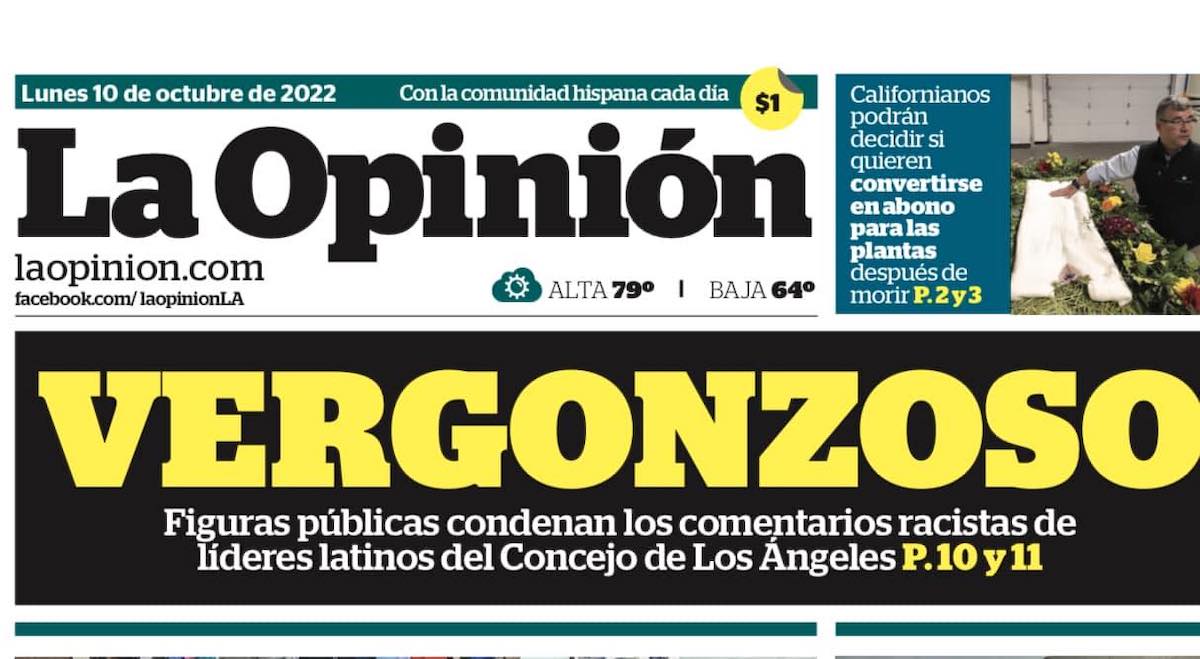Image: Monday’s front page cover of La Opinión denounced the leaked audio as “Shameful.”
Leaked audio of a conversation among leading Latino political figures in Los Angeles has rocked the city and made national headlines, stirring racial grievances many hoped had been left behind.
The scandal has already led to the resignation of Nury Martinez from her post as president of LA’s City Council, though she has refused calls to quit the council entirely, announcing a “leave of absence.” On the recording Martinez is heard making disparaging remarks about the city’s African Americans and Indigenous Oaxacans.
LA Labor Federation President Ron Herrera was also part of that conversation, which was focused on the city’s contentious redistricting process. Herrera announced his resignation yesterday.
Mireya Olivera is editor of Impulso newspaper, which covers the Oaxacan community in Los Angeles. “We Oaxacans have suffered this kind of discrimination here and in Mexico, and we have tried to combat it by making ourselves known through our culture, gastronomy, civic participation, festivals, etc.”, said Olivera. “Plus, we are recognized as very good workers.”
Olivera described the reaction from the community over the leaked audio as “angry” and at the same time painful because of the history of discrimination that her fellow countrymen have historically suffered.
There is a long history of discrimination toward Indigenous communities from Oaxaca and other parts of Mexico both in Mexico and in the Latinx community in the US.
“As a Zapotec Professor, born and raised in Koreatown, I am appalled to hear LA City Council members blatant racial attacks. Many of us Indigenous Oaxacans, however, are not surprised to hear this racial violence from non-Indigenous Latinx and Mexicans! It happens EVERYDAY!” Brenda Nicolas, an associate professor of Global Studies at UC Irvine, posted to Twitter shortly after news of the leaked audio broke.
Much of the Oaxacan community in Los Angeles is concentrated in Koreatown, and according to Olivera, both Councilman Gil Cedillo, whose district represents the area, and Kevin de León, representing surrounding areas to the east and northwest, “have had good relations with the community, attending events and festivals.”
Both Cedillo and de León were involved in the discussion with Martinez.
Martinez also used a Spanish term meaning “monkey” to describe Council-member Mike Bonin’s 2-year-old African American son, who Bonin adopted with his husband. Bonin gave a tearful speech before a raucous council meeting Tuesday where protestors demanded Martinez and the others’ resignation.
“How can they campaign against hate and racism? They have no moral standing,” Olivera said.
Lisa Fitch is editor-in-chief of Our Weekly, which covers the African American community in Los Angeles. She says this week’s print edition will feature news and analysis of the events now shaking the city.
“We consider this conversation hate speech, and unfortunately it is coming from the failed leadership of the city of Los Angeles,” said Fitch, whose paper is part of a statewide Stop the Hate campaign sponsored by the State of California and the State Library.
Fitch joined the growing chorus of calls, including from President Joe Biden, for the leaders to resign their posts. “No one trusts them any longer.”
Twenty percent of LA’s council seats are held by African Americans, even as the city’s Black population continues to dwindle, accounting for just over 8% of the population.
“I know that a lot of African Americans have moved out of the city because it has become so cost prohibitive to live here,” Fitch said. “But I am still around, like my parents and my sons. We were born and raised in the city, and I do believe that with the other representatives we have and — knock on wood — with an incoming mayor, we can move things forward.”
Whites in Los Angeles account for about 28% and continue to wield significant political and economic clout. Asians represent another fast-growing demographic. Latinos are by far the largest ethnic group, though their representation continues to lag other communities.
La Opinión is the nearly century-old dean of Spanish-language journalism in Los Angeles. It’s Monday edition featured the word SHAMEFUL in bold, dark lettering across the front page, one day following the leak of the audio. The paper then followed up on the same day with an editorial demanding the three council members resign.
“Their words do not represent the values of our community,” the editorial noted, “but just at a time when hate crimes and racism are on the rise, the fact shows that there is much to be done in terms of tolerance within our community.”
The editorial also raised concern over the potential damage done to relations between LA’s diverse communities.
“We fear that the words of Martinez and her colleagues will undermine decades of collaboration between African Americans and Latinos, communities united by a history of discrimination and the hardships they have faced,” the editorial stated.
La Opinión Editor Armando Varela stressed that racism “not only as a political issue but in the daily life of the community, be confronted and attacked and denounced,” noting such attitudes “are not born of a vacuum but are part of a cultural manifestation.
Varela sees it as part of his paper’s mission to “denounce these situations as a way to remedy them.”
He added that what happened is “a sadly definitive event for Latinos and the entire Los Angeles community and as such, we are giving it all the coverage it deserves.”
EMS editors Pilar Marrero and Peter Schurmann contributed reporting for this story.
This resource is supported in whole or in part by funding provided by the State of California, administered by the California State Library in partnership with the California Department of Social Services and the California Commission on Asian and Pacific Islander American Affairs as part of the Stop the Hate program. To report a hate incident or hate crime and get support, go to CA vs Hate.





